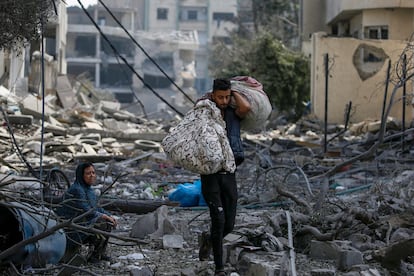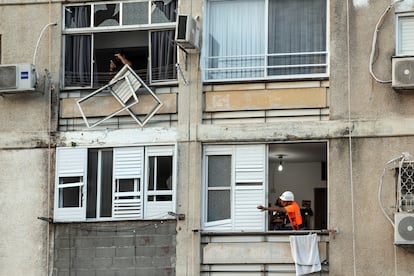Israeli bombardment of Gaza intensifies and Hamas responds with rocket barrage on Ashkelon
Israel claimed to have found 1,500 dead bodies of militiamen on its soil, as 200,000 Palestinians in Gaza sought refuge. An Israeli attack killed two senior Hamas officials

The Israeli army on Tuesday intensified the severity of its bombardment of the Gaza Strip and killed two members of Hamas’ political office, in an escalation of the conflict that began Saturday after the Palestinian militant group launched an offensive inside Israel that left at least 900 people dead. Images from the day show entire city blocks reduced to rubble. As they previously warned they would do, at 5:00 p.m. local time the military wing of Hamas launched a barrage of rockets on Ashkelon, a city in southern Israel with 170,000 inhabitants.
Israel claims to have regained control of all its territory, stopped further infiltration and found 1,500 bodies of Hamas militiamen who crossed into Israel in a surprise operation on Saturday. In Gaza, some 200,000 of the 2.2 million inhabitants have already sought refuge, either because they have lost their homes or because of the intensity of the air and naval bombardment and the expected ground incursion. Many of them are in schools run by UNRWA, the UN agency for Palestinian refugees. Gaza, where the death toll so far stands at 788, has been completely encircled since Monday, after Israel cut off food, electricity, and fuel supplies.
The United Nations Office for the Coordination of Humanitarian Affairs (OCHA) is reporting an increase in the last 24 hours of mass displacement and says it will continue to increase. On Tuesday, Egypt closed “until further notice” the only border crossing with Gaza not controlled by Israel, Rafah. It was barely functioning as of late Monday after being bombed. Under normal conditions, only a few Palestinians manage to get through this crossing (after long lines and often with bribes). On Monday, only those with an exit permit were allowed to cross into Egypt.

Israeli army spokesman Richard Hecht this morning advised Gazans to “get out” through Rafah, because a “disruptive and severe” offensive was coming, he said in a video conference with journalists. The army later clarified that Rafah is in fact closed and that it was not an official call for Gaza residents to flee to Egypt.
Hamas, for its part, stated Monday that it will begin executing an Israeli civilian hostage for every new airstrike that Israel launches without warning. This refers to the firing of small missiles — usually with very little explosive charge — shortly before the actual bombardment, so that civilians can run away.
According to the Israeli military, two Hamas officials were killed in an airstrike. Yoad Abu Shmala was the Minister of Economy in the Gaza government (in Hamas hands since 2007) and Zakaria Abu Maamar, the head of the internal relations department. Both belong to Hamas’ political office, not the military branch. An official Hamas source confirmed the deaths to Reuters.
Three journalists killed
Three Palestinian journalists have also been killed. Said al-Taweel, Mohammed Sobboh and Hisham Nawajhah were killed in a bombing that hit a residential building near the fishing port of the Gaza capital, the local journalists’ union reported.
UN High Commissioner for Human Rights Volker Türk on Tuesday condemned the total siege of the Gaza Strip. “The imposition of sieges that endanger the lives of civilians by depriving them of goods essential for their survival is prohibited under international humanitarian law,” he said in a statement.
Sign up for our weekly newsletter to get more English-language news coverage from EL PAÍS USA Edition
Tu suscripción se está usando en otro dispositivo
¿Quieres añadir otro usuario a tu suscripción?
Si continúas leyendo en este dispositivo, no se podrá leer en el otro.
FlechaTu suscripción se está usando en otro dispositivo y solo puedes acceder a EL PAÍS desde un dispositivo a la vez.
Si quieres compartir tu cuenta, cambia tu suscripción a la modalidad Premium, así podrás añadir otro usuario. Cada uno accederá con su propia cuenta de email, lo que os permitirá personalizar vuestra experiencia en EL PAÍS.
¿Tienes una suscripción de empresa? Accede aquí para contratar más cuentas.
En el caso de no saber quién está usando tu cuenta, te recomendamos cambiar tu contraseña aquí.
Si decides continuar compartiendo tu cuenta, este mensaje se mostrará en tu dispositivo y en el de la otra persona que está usando tu cuenta de forma indefinida, afectando a tu experiencia de lectura. Puedes consultar aquí los términos y condiciones de la suscripción digital.









































